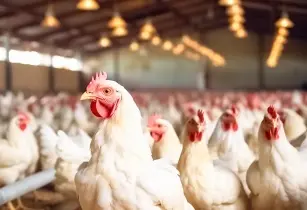Backed by latest scientific evidence, the report titled Bird flu: Only major farm reforms can end it, is urging governments to implement a three-point action plan which includes mass vaccination of flocks, radical restructuring of the poultry industry and changing the way pigs are farmed
According to the report, wild birds that are often considered to be the cause of bird flu are actually the victims of the disease, which is spiralling out of control due to the rise of factory farming. On 22 August, the animal welfare and environmental NGO wrote to the UK, Europe and US governments, urging them to work with the World Organisation for Animal Health (WOAH) and the United Nations Food and Agriculture Organisation (FAO) to implement this action plan without delay.
Although wild birds are generally less affected by the bird flu virus, it can evolve into the dangerous Highly Pathogenic Avian Influenza (HPAI) upon entering overcrowded factory farm poultry sheds. With their constant supply of hosts, these factories therefore create the ideal environment for the spread of the disease, allowing infections to spread rapidly, and for highly harmful new strains to emerge. Since 2021, more than half a billion farmed birds have died or been culled globally as a result of bird flu. Most of these were broilers confined in factory farms where they are crammed closely together in huge sheds, or egg-laying hens that live confined in cages around the size of an A4 sheet of paper.
"Bird flu is like a ticking time bomb. Unless we wake up and take urgent action to end factory farming we will simply be unable to stop its rapid spread across the globe or reduce the risk of a serious human pandemic developing," said author of the report and chief policy adviser at Compassion in World Farming, Peter Stevenson. “Cramming animals together in factory farms is not only totally inhumane, it is creating the perfect place for bird flu and other viruses to spread and mutate into more dangerous strains."
Apart from birds, the avian flu also spread to mammals including otters, foxes, dolphins, sea lions, mink, and domestic dogs and cats, among others. Moreover, the virus has also developed the ability to spread from one mink to another – something it previously had not been capable of in mammals; thereby making it far more dangerous. If it develops the same ability to spread between humans, it becomes a real pandemic risk.
Compassion in World Farming’s END.IT campaign is building a global movement to end factory farming and transform our global food system to ensure the future health of animals, people and our planet.
To sign the petition visit: www.END.IT





